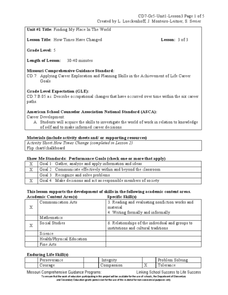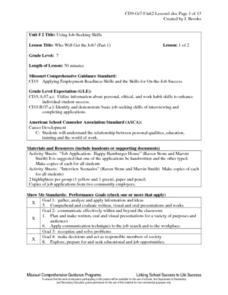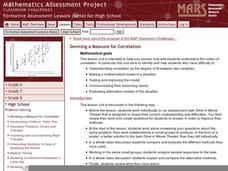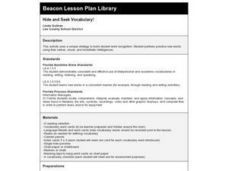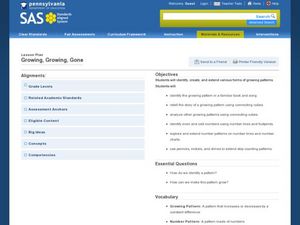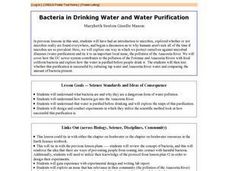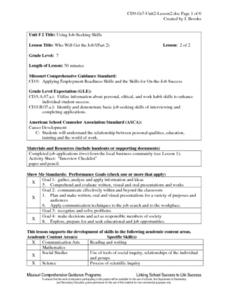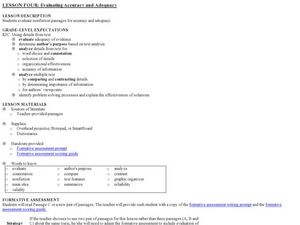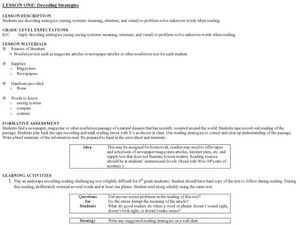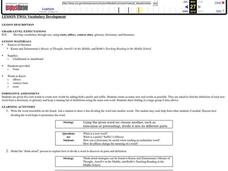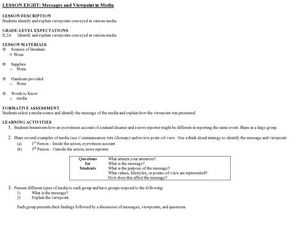Curated OER
Back In The "Old Days"
Fifth graders collect data during their worker interviews while in groups to compile job changes. They analyze the data to determine the categories of changes, patterns/trends of change and future projections. Each group then develops a...
Curated OER
How Times Have Changed
Fifth graders work in small groups to compile job changes. They use data from the list of changes that the group generated together. Students analyze the data to determine: categories of changes, patterns or trends of changes, and future...
Curated OER
Who Will Get The Job? (Part 1)
Seventh graders are asked a variety of questions and identify the skills as job-task or not. As a class, they discuss how they could lose a job before they start working and review how to sell their skills for the job posting. To end the...
Curated OER
Weaving a Story
It's time to investigate patterns! First and second graders construct a paper weaving using a hundreds chart, then use the Ti-10 calculator to make patterns such as adding 3 each time. Learners remove multiples of three from the hundreds...
Curated OER
Imagine That! Analyzing Imagery
Poems by O. Henry, Marion Dane Bauer, Monty Roberts, and Langston Hughes provide the text for a study of symbolism, hyperbole, and imagery. Employing the “think-pair-share” strategy learners generate definitions of these terms and locate...
Curated OER
Devising a Measure for Correlation
How well does your class understand the concept of correlation? Use an activity to explore different methods of calculating correlation. Working alone and then in groups, your class will make decisions on what math to apply to the...
Curated OER
Hide and Seek Vocabulary!
Third graders practice word recognition and vocabulary building. They find word cards in the classroom. Then they practice reading the words and using them in sentences. Additional practice is gained by writing the words and using them...
Curated OER
Orienteering - Lesson 2 - Topographical Maps
One of the most important skills in orienteering is being able to read a topographical map. Understanding the contour lines and symbols and the scale of the map will make planning your route so much better. In this lesson, partners get...
Curated OER
Personal Code of Ethics
Tenth graders develop a personal code of ethics and relate their personal code of ethics to school situations. They discuss steps they will take to resolve ethical issue at school and develop a personal plan to advocate for an ethical...
Curated OER
Responses to Literature
Middle and high schoolers hone their writing skills by reading Rikki-Tikki-Tavi and the poem Sarah Cynthia Sylvia Stout Would Not Take the Garbage Out. They fill out a graphic organizer (included here), and use the organizer to write an...
Curated OER
Shapes from Shapes
Geometric shapes are really cool. Examine triangles, quadrilaterals, trapezoids, rhombuses, parallelograms, pentagons, and hexagons with your class. They draw large shapes and small shapes then compare them to understand their shapely...
Curated OER
Growing, Growing, Gone
Budding mathematicians identify growing patterns in numbers and songs then create their own patterns. They look at number patterns and language patterns and then create their own using money and footprints.
Curated OER
Bacteria in Drinking Water And Water Purification
Students explore how sewer systems can contribute to water pollution and perform an experiment to see how well a water purification technique can protect against water-born microbial illnesses. They compare the bacterial growth from...
Curated OER
Who Will Get the Job?
Seventh graders demonstrate their ability to identify interview skills that lead to success in the job-seeking process by participating in and observing an interview with an employer. Students also use a checklist to validate their...
Curated OER
Analyzing Nonfiction Text Elements - Editorials
Examine the text features of non-fiction. Start the lesson by reading editorial samples provided by their instructor and analyze the texts for word choice, details, and organization. An editorial example and graphic organizer are...
Curated OER
Brochure Writing
What do you use a brochure for? Middle schoolers or underperforming high schoolers identify the attributes of informative brochures. Either bring in a few brochures you've collected or use the sample brochures attached here. While...
Curated OER
Using Pre-reading Strategies: Infer
Use this resource to support your class practicing inference with poetry and visual art. The plan calls for an examination of "The Scream" by Edvard Munch and the "Mona Lisa" to promote speculation about artist's intent. From there, it...
Curated OER
Irony in Poetry and Prose (Fiction and Non-fiction Texts)
Middle and high schoolers examine the impact of irony in poetry and prose. In this figurative language lesson plan, they read instructor-selected literature and identify uses of irony. Then they discuss how irony enhances literature.
Curated OER
Identify Text Features in Nonfiction
What does a non-fiction text look like? Examine the text features of non-fiction. Middle and high schoolers read non-fiction passages provided by their instructor and analyze the texts for word choice, details, and organization.
Curated OER
Evaluating Accuracy and Adequacy
Evaluate non-fiction works with your English class. While practicing a variety of strategies detailed in the plan, readers compare and contrast the information in three non-fiction passages about the same topic. They then discuss the...
Curated OER
Lesson One: Decoding Strategies
Review decoding strategies to read a chosen text. Readers tape themselves reading out loud, listen to the recording, and mark where they have misread words or phrases. They then discuss which words were misread and review how to correct...
Curated OER
Vocabulary Development
What is a root word? What is a prefix? Suffix? Use these questions to spark a discussion amongst your language art learners. Then, start by writing the word irresistible on the board and have teams of learners attempt to create new words...
Curated OER
Messages and Viewpoint in Media
Explore media point of view. In this literacy and current events lesson, pupils identify examples of first and third person point of view in media articles. They analyze examples of media, interpret the messages, and determine purposes...
Curated OER
Table Manners: Ready, Set
Help kids understand the importance of proper table manners through listening to the poem Table Manners and discussing formal etiquette. Afterward, the class can practice good table manners in a classroom feast!

